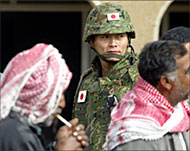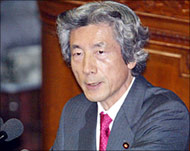Keeping foreigners out of Japan
The man in front of me laughs and shakes his head when I ask for his name.

“You can call me Mr Tanaka,” he says. Tanaka is one of the most common family names in Japan, but this man is clearly not Japanese. He is tall and and quite apparently non-Japanese.
His English is heavily accented, a cigarette is in one hand and the way he balances on the balls of his feet and constantly scans the crowds passing through Tokyo’s busy nightlife district of Shibuya suggests that he is ready for anything.
And “Mr Tanaka” has good reason to be wary. He and his three friends are illegally selling phone cards that have been altered so they can be re-used.
As well as not having a proper job, they do not have the correct documents allowing them to live in Japan. As illegal immigrants, they are the target of a new crackdown by Japanese authorities that has been condemned by some as Draconian.
We talk – guardedly – for a couple of minutes, until a friend gives a low whistle.
Before I have a chance to determine where the danger has come from, all four men have disappeared; one into a computer game centre, two down a subway entrance and the last into a narrow alleyway behind the restaurants and bars.
Sure enough, seconds later, three policemen with batons patrol down the street.
Rights violated
“The immigrants that I speak to feel as if they are victims and that their rights are being violated,” said Manami Yano, secretary general of Solidarity Network, an umbrella organisation for 90 human rights groups in Japan.
“Many are already scared to go out of their homes to go shopping or just to see friends as they are often stopped by the police and arrested.
 |
|
Japan has humanitarian missions |
“It’s true that it has been hard for immigrants for many years, but it has already gotten worse in the last year,” she said. “These people don’t have a big voice and the government is simply using them as scapegoats. They need a target to blame for the rising rate of crime here.”
The concerns of people such as Yano have been heightened after the Japanese government set loose a special investigation team in April to flush out illegal immigrants and meet a self-imposed deadline of halving the number of illegal aliens in Japan within five years.
According to the Justice Ministry, the new outfit will be made up of immigration officers and positioned in four areas of Tokyo with high concentrations of foreigners.
In the Shinjuku, Shibuya, Ikebukuro and Akasaka districts, the officers will work closely with police officers to identify foreigners who are working illegally.
According to the ministry, about 220,000 people have overstayed their visas and another 30,000 have been smuggled into Japan.
But of the tactics the authorities have deployed in the fight against foreigners, several have been strongly criticised.
World’s safest country
In its white paper on crime for fiscal 2002, the National Police Agency reported a record 3.69 million crimes, an increase of 3.1% on the previous year and a new record for the seventh consecutive year.
And while the clean-up rate for crimes was an improvement on the previous year’s 19.8% – the first time it had fallen below 20% since the end of World War II – an anaemic 20.8% was still too small for the authorities to be proud of.
 |
|
PM Koizumi is proud that Japan is |
“This is Japan, which is known as the safest country in the world. We have to seriously consider how we are going to restore that reputation,” Prime Minister Junichiro Koizumi said at the time.
The white paper singled out juveniles and foreigners as the leading causes of deteriorating public safety.
“Robberies perpetrated by foreigners became increasingly organised” during the year, the paper said. The situation “needs to be carefully monitored, because Japanese people are increasingly becoming the victims” of foreigners’ criminal acts.
Amnesty International, Japan, has criticised the government’s efforts to link rising crime to the foreign residents of the country as a political move to use “gaijin” – the pejorative Japanese word that literally means “outsiders” – as “scapegoats”.
“We believe this is all part of the government’s attempt to link
foreigners with crimes committed in Japan and it’s simply propaganda,” said Amnesty’s Sonoko Kawakami.
“There were similar crackdowns on over-stayers in the early 1990s, but not like this. This is on a much larger scale.”
Illegal residents
Amnesty was also outraged at the “big brother” tactics of Japan’s Ministry of Justice.
It teamed up with other human rights organisations to demand that the ministry remove from its web site a section that encourages Japanese to inform on foreigners they suspect of being illegal residents.
 |
|
Hiroshima Peace Memorial: many |
The ministry’s Immigration Bureau introduced the section on 16 February and, according to spokesman Mamoru Fukudaki, received more than 780 tip-offs from the public in the first month.
The site allows Japanese to report the presence of a foreigner in their neighbourhood whom they believe may be working or living in Japan without the appropriate documentation.
The site requests information such as name, nationality, home address or place of work, as well as the times they are most often at home.
The informant must also give a reason for reporting the person, with the choices including anxiety about the presence of foreigners.
“I don’t think the ministry is even aware that this is discriminatory,” said Kawakami. “They are under a lot of pressure from the public and the police and this just shows how racially discriminatory Japanese society has become in recent years.”
And while it is true that many overstayers have violated the immigration laws, “the government must ask itself why”, she added. “The reason is that Japanese don’t want to do manual labour, which Japanese industry needs, so these people are contributing to Japanese society.”
Known as the “3Ds” – for dirty, dangerous and difficult – foreigners work on building sites and in restaurant kitchens for lower wages and none of the benefits afforded to Japanese.
|
Known as the “3Ds” – for dirty, dangerous and difficult – foreigners work on building sites and in restaurant kitchens for lower wages and none of the benefits afforded to Japanese. |
The ministry, however, remains unaffected by the criticism.
“There is no problem with using this internet system from a legal point of view and we are not thinking of stopping the system,” Fukudaki said.
Yasushi Higashizawa, a lawyer and secretary general of the Japan Civil Liberties Union, expressed little surprise at the news.
“They fear pressure from the politicians and the public if they withdraw it,” he said. “But that overlooks the fact that they are contravening the basic human rights of foreigners, most of whom are not connected in any way with misconduct or crimes.”
Some foreigners, however, are fighting back.
Blatant racial discrimination
Debito Arudou is a vocal critic of racial discrimination in Japan since being refused entry to a hot spring in Hokkaido in 1999 on the grounds that he would scare the regular clients away.
He is calling on the prefectural government of Hokkaido to pass a local ordinance that would punish stores, restaurants, bars and any other public venue that turns a foreigner away.
A naturalised Japanese, who even changed his name from the original David Aldwinckle, he went as far as showing the owner of the hot spring his Japanese passport, but was still denied access.
|
Japan is the only developed nation in the world that does not have laws to specifically eliminate racial discrimination |
Even more bizarrely, he says, the management said his oldest daughter, who more closely resembles her Japanese mother, could enter, but his three-year-old, Western-looking daughter, was banned.
“This is obviously not a matter of citizenship, it’s a case of blatant racial discrimination,” says Arudou, 39, originally from New York but a permanent resident of Hokkaido since 1991.
“I’ve been refused entry to discos, barber shops, a sporting goods store and bars – even with a Japanese passport and where the hostesses are all foreign.
“The reason is usually that foreign customers are known to be criminals and the management doesn’t want them mixing with their regular clients,” he added.
That argument leaves him fuming.
“No-one can tell who’s a foreigner in Japan any more,” he said. “There are now thousands of international marriages every year and you simply cannot tell by looking at a person’s face whether they are Japanese or not.”
Japan is the only developed nation in the world that does not have laws to specifically eliminate racial discrimination, he said.
A good first step to achieving an open and multicultural society in Japan, he says, would be for signs that read “Japanese only” or “No foreigners” to be removed from establishments across Hokkaido and, eventually, all of Japan.
If the Hokkaido government does pass the law that he has suggested, it will be the first of its kind in Japan, although Arudou is not optimistic.
Previous attempts have ended up with the proposal “buried in committees”, although he is hopeful that one day, “it will happen and Japan will accept its internationalisation overnight”.